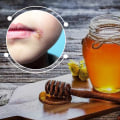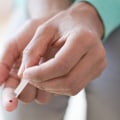Cold sores, also known as fever blisters, are small, painful lesions that can occur on or around the lips. They can be embarrassing and often uncomfortable, but they are quite common. In fact, it's estimated that up to 90 percent of people in the United States have been exposed to the virus that causes cold sores. Knowing what causes cold sores and how to best treat them can help you manage the condition. In this article, we will explore what cold sores on the lips are, what causes them, and what treatments are available.
We'll also discuss ways to reduce your risk of getting cold sores.
Understanding Cold Sores on the Lips
Cold sores on the lips are painful blisters that can appear suddenly and last for several days. They are caused by a virus, and while they cannot be cured, there are ways to manage them and reduce discomfort.The virus that causes cold sores on the lips is called herpes simplex virus (HSV).
It is spread by direct contact with the skin of someone who has the virus, as well as through contact with saliva, mucus, or other bodily fluids. It can also be spread through sharing items such as lip balm, cups, or utensils.Risk factors for developing cold sores on the lips include having a weakened immune system, engaging in activities that can spread the virus, such as kissing or sharing items with someone who has an active cold sore, and exposure to sunlight or wind. Symptoms of cold sores on the lips include tingling, burning, itching, or pain in the affected area. The affected area may also appear red and swollen. Cold sores usually heal on their own within a few days to two weeks.
To prevent cold sores on the lips
, it is important to avoid contact with people who have active cold sores and to avoid touching your face or lips if you have an active cold sore.It is also important to use sunscreen to protect your lips from sunburns.
There are various treatments available for managing cold sores
, including topical creams and ointments, oral medications, and natural remedies. Topical treatments are usually applied directly to the affected area several times a day to reduce pain and speed up healing. Oral medications may be prescribed to reduce symptoms and speed up healing time.Natural remedies such as aloe vera gel or tea tree oil may help reduce discomfort and promote healing. It is important to choose the right treatment for your needs and to seek medical advice for more severe symptoms.
Self-care techniques can also help reduce discomfort from cold sores.
These include using a cool compress or taking a pain reliever, such as ibuprofen or acetaminophen. Additionally, it is important to practice good hygiene by washing your hands often and avoiding contact with others if you have an active cold sore.This will help reduce the risk of spreading the virus to others.
Diagnosing Cold Sores
Diagnosing cold sores on the lips usually involves a physical examination and an assessment of the symptoms. A doctor can usually identify a cold sore based on its appearance and the accompanying symptoms. The doctor may take a swab or sample of fluid from a cold sore to confirm the diagnosis.A doctor will begin by asking questions about the patient’s medical history and any medications they are taking. They may also examine the area to confirm the presence of a cold sore. A swab or sample of fluid from a cold sore may be taken to test for the virus that causes the infection. This is known as a laboratory test.
The doctor may also order tests to rule out other conditions, such as canker sores, allergic reactions, or bacterial infections. These tests may include blood tests, skin scrapings, or biopsies. In some cases, doctors may prescribe antiviral medications to help reduce the symptoms of cold sores. These medications can help reduce the duration of an outbreak and lessen the severity of the symptoms. If a person suspects that they have a cold sore, it is important to contact their doctor. They can provide advice and treatment options to help manage the condition. Cold sores on the lips are painful blisters that can appear suddenly and last for several days.
They are caused by a virus, and while there is no cure, there are ways to manage and reduce discomfort. In this article, we discussed the causes of cold sores on the lips, prevention methods, and treatments available for cold sores on the lips. It is important to practice self-care and hygiene to reduce discomfort and prevent the spread of the virus. To diagnose cold sores, it is important to pay attention to any changes in the lips. Common signs and symptoms include tingling, itching, burning, or redness of the skin around the lips.
Additionally, blisters may form and burst. If you experience any of these symptoms, it is important to consult your doctor for diagnosis and treatment.


